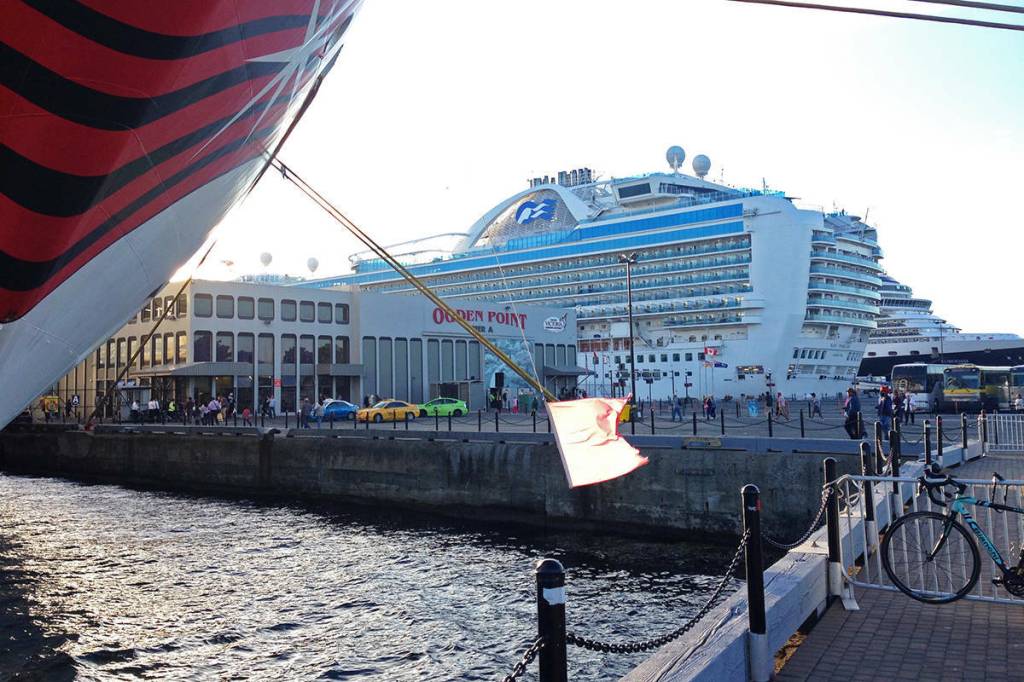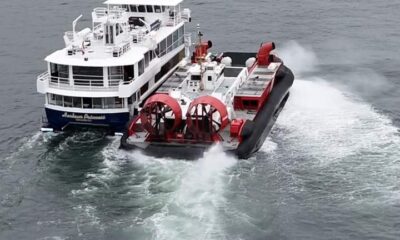Top Stories
Greater Victoria Cancels Cruise Shore Power Project Amid Costs

URGENT UPDATE: The Greater Victoria Harbour Authority (GVHA) has just announced the cancellation of its much-anticipated shore power project at Ogden Point, a critical initiative aimed at reducing cruise ship emissions. This decision comes in response to soaring costs and increased project complexity, raising serious concerns about financial viability.
Despite securing a commitment of $31.5 million from Transport Canada and the B.C. Ministry of Transportation, GVHA reported that a detailed feasibility review revealed an alarming $61 million funding shortfall. The authority noted that the costs to implement the project would range from $92.5 million to $159 million, depending on the chosen solution, which included options like constructing a large electrical substation and extending a 7.5 km power cable from Topaz Park to Ogden Point.
Officials expressed their disappointment, stating, “The $61 million shortfall is too large for GVHA to fund as a self-financed, non-profit organization.” This cancellation is particularly concerning for the community, as the project would have compromised key local assets including the Ogden Point Breakwater and Fisherman’s Wharf.
The shore power initiative was first proposed in 2019 as part of GVHA’s commitment to cutting greenhouse gas emissions from docked cruise ships. By allowing vessels to plug into cleaner, landside electrical power, the project aimed to eliminate the need for ships to rely on auxiliary diesel engines while at berth—a practice known as ‘hoteling.’ Current estimates indicate that this method contributes to over 60% of hazardous emissions from ships during their time in port.
The Journal of Cleaner Production previously highlighted the substantial environmental benefits of shore power, emphasizing its role in reducing emissions and noise pollution. However, the transition to shore power has faced significant hurdles globally, with ports grappling with upgrade costs, vessel retrofitting expenses, and concerns regarding return on investment. In 2025, more than 40 ports worldwide are expected to have developed or begun work on shore power facilities, but the financial challenges remain a persistent barrier.
In light of this setback, GVHA has reiterated its commitment to decarbonization and energy efficiency across its properties. “This decision was not taken lightly. We understand that many people want to see continued progress in reducing cruise-related emissions. That remains a top priority,” GVHA stated. The authority is now focusing on an integrated planning initiative to identify alternative solutions moving forward.
As this situation develops, stakeholders and environmentally-conscious citizens will be keenly watching for GVHA’s next steps in addressing the urgent need for cleaner shipping practices. The cancellation of this project underscores the complexities and financial realities of transitioning to more sustainable port operations, leaving many to wonder what the future holds for cruise ship emissions in Victoria.
Stay tuned for further updates as GVHA explores new avenues for reducing environmental impact and enhancing community assets.
-

 World3 months ago
World3 months agoScientists Unearth Ancient Antarctic Ice to Unlock Climate Secrets
-

 Entertainment4 months ago
Entertainment4 months agoTrump and McCormick to Announce $70 Billion Energy Investments
-

 Lifestyle3 months ago
Lifestyle3 months agoTransLink Launches Food Truck Program to Boost Revenue in Vancouver
-

 Science4 months ago
Science4 months agoFour Astronauts Return to Earth After International Space Station Mission
-

 Technology2 months ago
Technology2 months agoApple Notes Enhances Functionality with Markdown Support in macOS 26
-

 Top Stories2 weeks ago
Top Stories2 weeks agoUrgent Update: Fatal Crash on Highway 99 Claims Life of Pitt Meadows Man
-

 Sports3 months ago
Sports3 months agoSearch Underway for Missing Hunter Amid Hokkaido Bear Emergency
-

 Politics3 months ago
Politics3 months agoUkrainian Tennis Star Elina Svitolina Faces Death Threats Online
-

 Technology3 months ago
Technology3 months agoFrosthaven Launches Early Access on July 31, 2025
-

 Politics3 months ago
Politics3 months agoCarney Engages First Nations Leaders at Development Law Summit
-

 Entertainment3 months ago
Entertainment3 months agoCalgary Theatre Troupe Revives Magic at Winnipeg Fringe Festival
-

 Politics2 weeks ago
Politics2 weeks agoShutdown Reflects Democratic Struggles Amid Economic Concerns

















